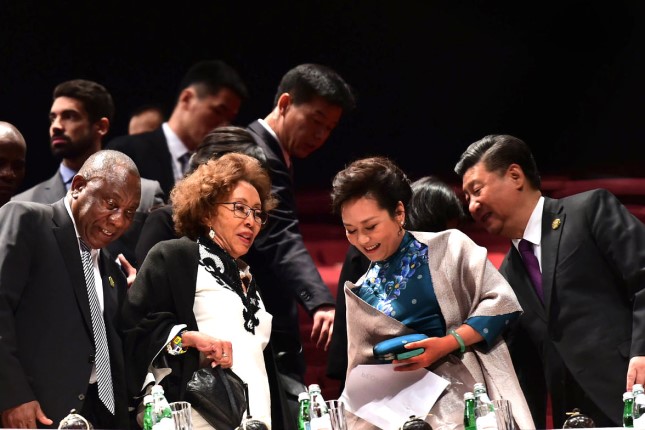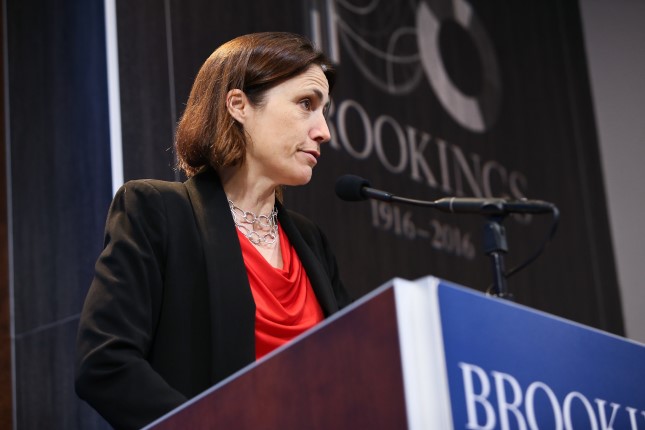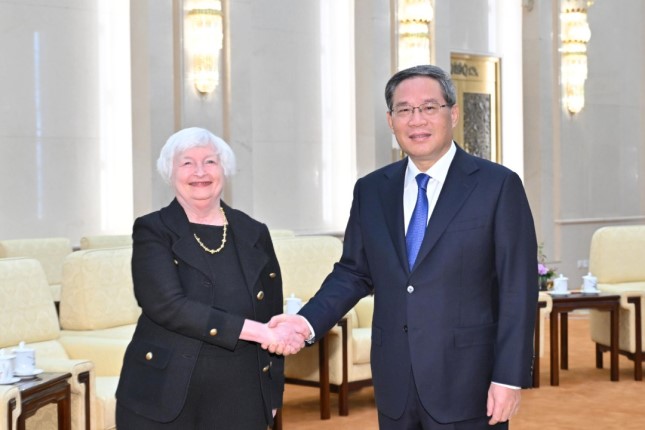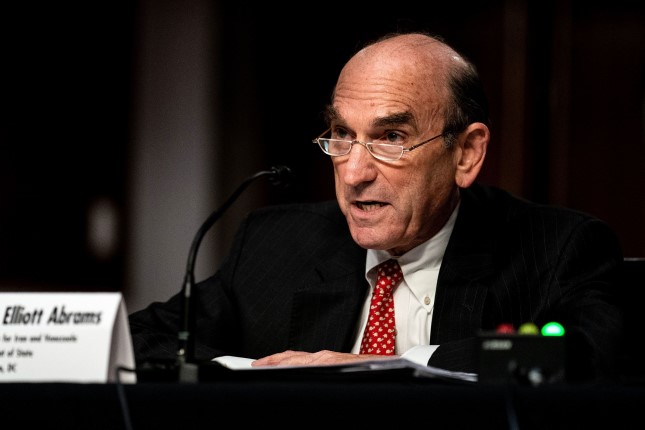I count the advance among non–Western nations toward what we now call a new world order the single most momentous development of our time.
This turn in history’s wheel will define our century, it is not too much to say. But to listen to the speeches, pronouncements and offhand remarks of the power and policy cliques in Washington you would think there is no such elephant in the room.
And so, I ask: Can I be the only one to wonder whether those shaping and conducting American foreign policy are blind to this immense global shift, or deaf to what the non–West lately has to say to the West, or too stupid to understand events, or in denial, or maybe some of all four?
Blind, deaf, stupid, in gutless denial, this last a subset of stupid: Each of these explanations has its temptations as we assess the cognitive capacities of the elites who sequester themselves inside the Washington Beltway.
But it has been awfully hard to settle with certainty on the cause of our policy people’s apparent inability or refusal to acknowledge that world history has entered a period of epochal change.
At last an answer to this perplexing question, or a useful suggestion of one. Blind or stupid are not the explanations we are looking for. Deafness and denial are.
I draw these conclusions by way of a speech by Fiona Hill, an over-credentialed foreign policy operative of conspicuous neoliberal convictions. She delivered it last week at a research institute in Estonia, a nation that that sits on the knife’s-edge divide between East and West.
By way of background, Hill is one of those revolving-door people who float on the froth of academic and think tank salaries when not in government. A Russianist by training, she was an intelligence analyst for the Bush II and Obama administrations.
She then served on President Donald Trump’s National Security Council until she turned on Trump during his 2019 impeachment hearings and had a few moments under the Klieg lights. Hill is now a senior fellow at the Brookings Institution and will take up duties this summer as chancellor at Durham, the British university.
Maybe Hill speaks with a looser tongue now that she will return to her native England. This is hard to say. But I read her speech as a significant expression of the perceptions commonly shared among our policy cliques on both sides of the Atlantic.
It turns out that Hill and her colleagues in Washington and other Western capitals know perfectly well that the non–West’s most influential nations are building a global order that restores the authority of international law and international institutions after decades during which both have been abused or ignored.
I take some comfort, honestly, in knowing that those shaping and executing Western policy are not so blind or stupid as to miss this.
It is cold comfort, I have to add. I conclude from Hill’s remarks that the technocrats, scholars, and political figures who think through and determine U.S. foreign policy, and by extension the Atlantic world’s, cannot hear those now bringing a new world order into being, and they are in abject denial as to the right responses to this world-turning and profoundly promising undertaking.
"The Rest’s Rebellion"
Hill titled her speech “Ukraine and the New World Disorder,” and subtitled it, “The Rest’s Rebellion Against the United States.” Immediately it is clear she is about to get some things very right and others very wrong. The transcript of this speech is well worth reading. It is here.
To posit that some pre–Ukraine order is to be replaced by a post–Ukraine disorder is to turn the world upside down. To refer to the non–West as “the rest” is hopelessly retro, and in my read Orientalist to the core.
These errors betray a Western-centric ideology that severely limits the ability of people such as Hill to understand the world as it is. This is what I mean by denial.

From left: South African President Cyril Ramaphosa and his wife Tshepo Motsepe, Peng Liyuan and her husband Xi Jinping, president of China, at a cultural event in Johannesburg during a 2018 BRICS meeting. {Photo: GovernmentZA / Flickr / CC BY-ND 2.0.
At the same time, there are some startling observations in this presentation, given who is doing the observing. Here are a few that are bound to turn the heads of those who have wondered along with me about the blindness, deafness, and so on in Washington: “The war in Ukraine is perhaps the event that makes the passing of pax Americana apparent to everyone.”
And: “… countries that have traditionally been considered ‘middle powers’ or ‘swing states’ — the so-called ‘Rest’ of the world — seek to cut the U.S. down to a different size in their neighborhoods and exert more influence in global affairs. They want to decide, not be told what’s in their interest. In short, in 2023, we hear a resounding no to U.S. domination and see a marked appetite for a world without a hegemon.”
And further on: “… the next iteration of the global security, political and economic system will not be framed by the United States alone. The reality is already something else….”
Remarkable, coming from someone such as Fiona Hill. It makes you wonder about the extent to which a lot of intelligent people in Washington must stifle their thoughts and so seem for all the world stupid.
Captives of an Ideology

Gate in the medieval city wall of the old town of Tallinn, Estonia. Photo: elrentaplats / Flickr / CC BY-NC-SA 2.0.
On the other side of Hill’s ledger there are misapprehensions and omissions that betray the policy cliques she can be taken informally to represent as captives of an ideology deeply rooted in half a millennium of Western superiority and deeply incapable of accommodating a world based on equality among nations.
It seems beyond these people to grasp that “the West and the rest” is precisely the binary the non–West proposes to transcend.
Remember when, in February 2022, Russian President Vladimir Putin and Chinese President Xi Jinping issued their Joint Statement on International Relations Entering a New Era, which I continue to consider the most significant political document to be published so far in our century? The Russian and Chinese leaders were explicitly anti-anti–Western in that declaration.
Remember when the Chinese Foreign Ministry, this past February, issued its Global Security Initiative Paper, wherein Beijing stated that “the historical trends of peace, development, and win-win cooperation are unstoppable?” Anti-hegemonic powers, yes. Anti–Western, not by any stretch.
Either Hill has not read these papers — perfectly plausible, given the whole of Washington ignored them — or she cannot hear the voices raised in them. Nor does Hill seem to register the elaboration and enlargement of such non–Western partnerships as the BRICS and the Shanghai Cooperation Organization.
The new world order, she told her audience, “is not an ‘order,’ which inherently points to a hierarchy, and perhaps not even a ‘disorder.’”
It is simply wrong, tone deaf. All forms of order are inherently hierarchical? Fiona Hill should travel more often beyond the borders of the West.
Thankfully enough, Hill goes on to contradict herself on at least some of these points: “We in the trans–Atlantic community may need to develop some new terminology as well as adapt our foreign policy approaches to deal with horizontal networks of overlapping and sometimes competing structures. … The regionalization of security, trade, and political alliances complicates our national security strategies and policy planning, but it may also intersect with our priorities in useful ways if we can be flexible and creative — rather than simply resisting and responding when things go in directions we don’t like….”
Again, remarkable. It may be that Hill, who is 57, has chosen an interim that will shortly leave her an ocean away from Washington’s policy circles to speak more candidly than she ever did during her inside-the–Beltway years. While her thinking on this point lies beyond us, those who rotate in and out of power sometimes take such opportunities to say what they would not otherwise dare to say.
Hill’s speech at the International Centre for Defence and Security in Tallinn is certainly worthy of interpretation whatever this case may be. I detect in it the very faintest signs that those most intimately involved in shaping U.S. foreign policy will gradually come to understand that pretending the U.S. remains the world’s unchallenged imperium is a game that they can play a little while longer but not forever.
Most nations we count as non–Western fold their hands as we speak.
Washington’s policy elites still close their ears to what the vast majority of humankind has to say about the 21st century order. They remain in denial. But I don’t think they are blind, after all, to those unstoppable historic trends the Chinese mentioned a couple of months ago.
Main photo: Fiona Hill in 2016 © Brookings Institution / Flikcr / CC BY-NC-ND 2.0.
Source: Consortium News.
































